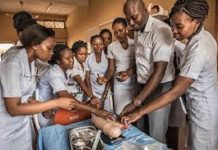Some polio victims at an event
One of the most troubling health challenges that many African children have had to grapple with has been the life-long disabilities that result from poliomyelitis. Otherwise called polio or infantile paralysis, the virus responsible for this devastating condition is caused by the polio virus which is usually seen in children. The virus is spread from one individual to the other through infected faeces entering through the mouth.
The disease is largely seen in third world or developing countries at the moment and it must be stated that it has been in existence for thousands of years. In the 20th Century, it became disturbing that the virus took a most devastating swipe on children. While the vaccine was developed in the 1950s, the spread of the virus reached an alarming concern in 2013 when there were reports of new cases in Syria. Asia, Africa and the Middle East became the focus of the World Health Organisation (WHO). Therefore, in May 2014 the World health body reportedly declared a public health emergency of international concern resulting from the outbreaks of the disease, while Nigeria, Afghanistan and Pakistan were the worst hit.
Speaking at an event in 2014, the representative of the World Health Organisation in Nigeria, Dr David Okello, noted that Nigeria was ranked alongside Pakistan and Afghanistan since they were grappling with the disease. According to him, “Nigeria indeed is the largest contributor of global polio burden, nearly 60 per cent. Nigeria is also the only country in the world to have all three types of polio virus, Type 1, Type 3, and circulating vaccine-derived Type 2 viruses.”
Okello further explained that the transmission of the disease in Nigeria posed a real threat to the global polio eradication effort, disclosing that of the 49 cases reported in the country, two-thirds were from four particular sanctuaries, the northern states of Borno, Kano, Sokoto and Zamfara.
It would be recalled that for over a decade ago, the campaign against polio suffered major setbacks particularly in Nigeria’s north as politicians and religious leaders spread rumours that the vaccine against the disease was responsible for the spread of infertility in women and AIDS, which prompted the President Goodluck Jonathan-led administration to increase the awareness and fighting of the age-long stereotypes about the disease.
Major progress
However, in January 2015, the Global Eradication Initiative on Polio reported a milestone achievement in Nigeria’s war against polio. It said January 24, 2015, marked six months with no cases of wild polio in Nigeria, a country which was earlier regarded as the only endemic nation in Africa.
In its report, the body noted that the milestone marked a major achievement for the global programme, which it said had faced significant challenges in Nigeria in the past years. It attributed the achievement to the increased political commitment, programmatic innovations and determination from a huge number of stakeholders and the Nigerian government, urging the need for vigilance and focus as the country had never passed six months without a case.
Also commending President Goodluck Jonathan in 2014, American business magnate and philanthropist, Bill Gates, who also is the co-chair of the Bill & Melinda Gates Foundation, a foundation committed to fighting polio, among other objectives, stated that it was noteworthy that the Goodluck Jonathan administration recorded a significant success in its fight against the endemic disease.
In Gates’ words: “Nigeria has reported only six cases of polio in 2014, compared to what it had in 2013. What’s more, the infrastructure Nigeria has built to fight polio actually made it easier for them to swiftly contain Ebola. The fact that Nigeria is now Ebola-free is a great example of how doing the work to fight things, like fighting polio, also leaves countries better prepared to deal with outbreaks of other diseases,” Gate said.
Gates also added that polio eradication around the globe remained a top priority to the Bill & Melinda Gates Foundation, adding that as a major supporter of the GPEI, the foundation remarkably contributes technical and financial resources to partners with the intent of accelerating efforts to eradicate polio.
Gaping gaps
In his contribution to the polio debate, Chairman of Rotary International Polio Plus Committee in Nigeria, Dr Tunji Funso has highlighted the existing gaps to be closed on polio in Nigeria. He stressed that notwithstanding the success recorded, Nigeria must persistently push for complete eradication of the disease.
He explained that “one of the important things is to avoid complacence. “We know we’ve done very well, but usually, things can go wrong. We had got almost this close before in 2010 when we had reduced all cases phenomenally by almost 80 per cent. But, now, we have gone further than that, we have reduced by over 90 percent. So, one of the things we are going to do is that we are not complacent. We want to build on the strength of what we have done, we also want to ensure that those things that still need to be done, particularly the challenge of having to reach children in the security-challenged areas, either because of access or because they are now Internally Displaced Persons.”
Concerning the cheery news that Nigeria will be certified polio free in 2015, an expert on the disease and Chairman, Experts Review Committee on polio eradication, Prof. Oyewale Tomori, has said that Nigeria can only be certified polio-free in 2018 if the country does not record any new case of polio this year 2015. He made the declaration during the 29th meeting of the ERC on Polio and Routine Immunisation, held at Rockview Royale Hotel, Abuja.
Professor Tomori based his assertion on the World Health Organization (WHO) regulations regarding polio. According to him, it would take three years of zero-incidence before a country can be certified polio-free. He noted that there are efforts going on to ensure there are no new cases of polio in the next three years.
Speaking in the same vein, David Ross, immediate past head of the Canadian International Development Agency (CIDA), said that there are indications that Nigeria may not be able to achieve the goal of totally eradicating polio in 2015 as a result of several challenges such as insecurity in the north, migration of people from one place to another and several other issues that are militating against the total eradication of polio in Nigeria.
“I think that Nigeria is on course to eradicating polio completely although there are some challenges, particularly given the security situation in parts of the north and the movement of population which affects the spread of the virus,” Ross said.
He further added, “The wild polio cases recorded last year (2014) is an issue the country needs to pay attention to by making sure that it is totally free of either of the two types of viruses. The job is not finished; there is the need for more funds, because it is even more difficult in the last stage. To rid this country of polio, funding must not only be sustained but improved. Also, the activities that have been done so far in this year’s surveillance and making sure they get to the children must be intensified. This country took care of Ebola by doing aggressive surveillance and with aggressive vaccination of children, we can get rid of polio in Nigeria.”
Heightened tempo
Indeed, as the country dashes towards the final stage in eradicating the polio virus, there is need to show more commitment and dedication and there is also need to continue motivating leaders at all levels, as well as community workers, to continue their efforts because the goal is possible. Although, the country still has three more years to go to ensure certification, vaccination must be made available not only for polio, but against all forms of communicable diseases so as to help reduce mortality.
Government in particular must intensify campaigns for routine immunisation so that other cases will not be recorded. In fact, this is the time government should declare more for the purpose of national immunisation exercise, so that no child in the country will be left out.
Polio and immunisation go together, so If we make gains in polio eradication without maintaining routine immunisation, we may not be able to sustain the gain; therefore, proper attention must be given to the two.











